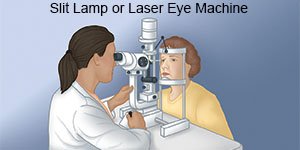Laser Surgery for Glaucoma
Medically reviewed by Drugs.com. Last updated on Jun 5, 2024.
Laser surgery for glaucoma is used to open your eye drainage system, or create a new drainage system. Glaucoma is caused by fluid buildup behind the eye. This surgery helps decrease eye pressure and slow or prevent more damage and vision loss. You may need surgery on one or both eyes.
 |
WHILE YOU ARE HERE:
Before your surgery:
- Informed consent is a legal document that explains the tests, treatments, or procedures that you may need. Informed consent means you understand what will be done and can make decisions about what you want. You give your permission when you sign the consent form. You can have someone sign this form for you if you are not able to sign it. You have the right to understand your medical care in words you know. Before you sign the consent form, understand the risks and benefits of what will be done. Make sure all your questions are answered.
During your surgery:
You will be given eye drops to numb your eye. You will sit in a chair in front of a slit lamp. A slit lamp is the instrument eye doctors use to look in your eye. The laser machine is attached to the slit lamp. Your eye doctor may use a face holder to help keep your head still during surgery. He or she will put a special contact lens on your eye to aim the laser on the areas to be treated. During the treatment, you will see flashes of colored light. Laser surgery may be done more than 1 time. You may have one of the following types of laser surgery:
- Trabeculoplasty is used to open clogged areas of your eye drainage system. This will help fluid drain from your eye and decrease pressure.
- Trabeculotomy is used to remove tissue to help fluid drain more easily.
- Iridotomy is used to make a tiny hole in your iris. The iris is the colored part of your eye. This will allow fluid to drain from your eye and decrease pressure.
 |
After your surgery:
You will be taken to a room where you can rest after your surgery. Your eye doctor will check your eye pressure. You will be able to go home when your eye doctor says it is okay.
- Medicines may be given to decrease inflammation and eye pressure or help your eye heal.
- Your eye may feel irritated, and you may have blurry vision. These are expected and should get better quickly.
- You will need to wait 4 to 6 weeks before you know if surgery worked. You may need to have the surgery again if the effects wear off. You may also need another type of surgery.
- You may need to keep taking glaucoma medicine even after surgery.
- The pressure in your eye will need to be checked regularly over time. Your eye doctor or surgeon will tell you when to come in for check-ups.
RISKS:
You may get an infection and your eye may bleed. Your eye pressure may not get better and could become worse. Your vision may be worse than before the surgery. You may not be able to have another laser surgery for your glaucoma. You may develop cataracts (cloudy, dark vision) after laser surgery.
CARE AGREEMENT:
You have the right to help plan your care. Learn about your health condition and how it may be treated. Discuss treatment options with your healthcare providers to decide what care you want to receive. You always have the right to refuse treatment.© Copyright Merative 2024 Information is for End User's use only and may not be sold, redistributed or otherwise used for commercial purposes.
The above information is an educational aid only. It is not intended as medical advice for individual conditions or treatments. Talk to your doctor, nurse or pharmacist before following any medical regimen to see if it is safe and effective for you.
Further information
Always consult your healthcare provider to ensure the information displayed on this page applies to your personal circumstances.
